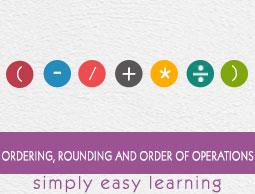
- Home
- Introduction to Inequalities
- Comparing a Numerical Expression With a Number
- Ordering Large Numbers
- Rounding to Tens or Hundreds
- Rounding to Hundreds or Thousands
- Rounding to Thousands, Ten Thousand, or Hundred Thousand
- Estimating a Sum of Whole Numbers
- Estimating a Difference of Whole Numbers
- Estimating a Product of Whole Numbers
- Estimating a Quotient of Whole Numbers
- Writing Expressions Using Exponents
- Introduction to Exponents
- Power of 10: Positive Exponent
- Power of 10: Negative Exponent
- Introduction to Parentheses
- Comparing Numerical Expressions With Parentheses
- Introduction to Order of Operations
- Order of Operations With Whole Numbers
- Order of Operations With Whole Numbers and Grouping Symbols
- Order of Operations With Whole Numbers and Exponents: Basic
Rounding to Thousands, Ten Thousand, or Hundred Thousand
Definition
Rounding of a number means replacing it with another number that is nearly equal to it but easy to represent or write. For example 4397 is rounded to 4000.
If the rounding number is 4 or less it is round down. If the rounding number is 5 or more it is rounded up.
For example 3100, 3200, 3300 and 3400 round down to 3000
3500, 3600, 3700, 3800 and 3900 round up to 4000.
Rules for Rounding to Thousand, Ten Thousand or Hundred Thousand
To round a number to the nearest thousand, the digit in hundreds place is considered. If > = 5, rounded up and if < 5 rounded down.
To round a number to the nearest ten thousand, the digit in thousands place is considered. If > = 5 rounded up and if < 5 rounded down.
To round a number to the nearest hundred thousand, the digit in ten thousands place is considered. If > = 5 rounded up and if < 5 rounded down.
Problem 1
Round 354,731 to the nearest thousand.
Solution
Step 1:
The digit in thousands place is 4. So we can either round down to 354,000 or round up to 355,000.
Step 2:
Now let us look at the digit to the right of 7, the hundreds place, which is 7.
Step 3:
Since 7 is greater than 5, so we round up 354,731 to 355,000
Problem 2
Round 673,189 to the nearest ten thousand.
Solution
Step 1:
The digit in ten thousands place is 7. So we can either round down to 670,000 or round up to 680,000.
Step 2:
Now let us look at the digit to the right of 7, the thousands place which is 3.
Step 3:
Since 3 is less than 5, so we round down 673,189 to 670,000
Problem 3
Round 250,875 to the nearest hundred thousand.
Solution
Step 1:
The digit in hundred thousands place is 2. So we can either round down to 200,000 or round up to 300,000.
Step 2:
Now let us look at the digit to the right of 2, the ten thousands place which is 5.
Step 3:
Since it a 5, we round up 250, 875 to 300,000